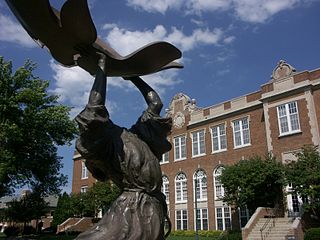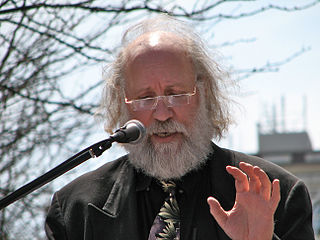
St. Peter is a city and the county seat of Nicollet County, Minnesota United States. It is 10 miles north of the Mankato – North Mankato metropolitan area. The population was 12,066 at the 2020 census. It is home to Gustavus Adolphus College.

The University of the Cumberlands is a private Christian university in Williamsburg, Kentucky. Over 20,000 students are enrolled at the university.
Academic tenure in the United States and Canada is a contractual right that grants a teacher or professor a permanent position of employment at an academic institution such as a university or school. Tenure is intended to protect teachers from dismissal without just cause, and to allow development of thoughts or ideas considered unpopular or controversial among the community. In North America, tenure is granted only to educators whose work is considered to be exceptionally productive and beneficial in their careers.

The University of Dubuque (UD) is a private Presbyterian university in Dubuque, Iowa. About 2,200 students attend the university.

The Catholic University of America (CUA) is a private Catholic research university in Washington, D.C., United States. It is the only pontifical university of the Catholic Church in the United States and the only institution of higher education founded by the United States Conference of Catholic Bishops. Established in 1887 as a graduate and research center following approval by Pope Leo XIII, the university began offering undergraduate education in 1904. It is classified among "R2: Doctoral Universities – High research activity".
Academic freedom is the right of a teacher to instruct and the right of a student to learn in an academic setting unhampered by outside interference. It may also include the right of academics to engage in social and political criticism.

Minnesota State University, Mankato is a public university in Mankato, Minnesota, United States. It is Minnesota's second-largest university and has over 145,000 living alumni worldwide. Founded in 1868, it is the second-oldest member of the Minnesota State Colleges and Universities system and is commonly referred to as the flagship institution. It was established as the Second State Normal School in 1858 and officially opened as Mankato Normal School a decade later. Minnesota State University, Mankato is a significant contributor to the local and state economies, adding $827 million annually.

The American Association of University Professors (AAUP) is an organization of professors and other academics in the United States. AAUP membership includes over 500 local campus chapters and 39 state organizations.

Gustavus Adolphus College is a private liberal arts college in St. Peter, Minnesota. It was founded in 1862 by Swedish Americans led by Eric Norelius and is affiliated with the Evangelical Lutheran Church in America. Gustavus was named for Gustavus Adolphus, the King of Sweden from 1611 to 1632. Its residential campus includes a 125-acre arboretum.

Palm Beach Atlantic University (PBA) is a private nondenominational Christian university in West Palm Beach, Florida. The university's nine colleges focus on the liberal arts with a select collection of professional studies. In 2023, its undergraduate enrollment was approximately 2,400.

Paul Theodore Granlund was an American sculptor. His creative career spanned more than 50 years and more than 650 different works. Most of his work is figurative and made from bronze. His patrons included colleges, hospitals, Lutheran churches, and other institutions.
Tenure is a type of academic appointment that protects its holder from being fired or laid off except for cause, or under extraordinary circumstances such as financial exigency or program discontinuation. Academic tenure originated in the United States in the early 20th century, and several other countries have since adopted it. Tenure is a means of defending the principle of academic freedom, which holds that it benefits society in the long run if academics are free to hold and espouse a variety of views, even if the views are unpopular or controversial.
Governance in higher education is the means by which institutions for higher education are formally organized and managed. Simply, university governance is the way in which universities are operated. Governing structures for higher education are highly differentiated throughout the world, but the different models nonetheless share a common heritage. Internationally, tertiary education includes private not-for-profit, private for-profit, and public institutions governed by differentiated structures of management.

Cary Nelson (1946), is an American professor emeritus of English and Jubilee Professor of Liberal Arts and Sciences at the University of Illinois at Urbana-Champaign. He was president of the American Association of University Professors between 2006 and 2012.
Academic freedom at Brigham Young University (BYU) has been the subject of several controversies, mostly focusing on its religious nature. In 1992, BYU issued a statement limiting academic freedom in certain areas, including language that attacked the Church of Jesus Christ of Latter-day Saints, and language that violates the university's honor code.

Frederick Stephen Humphries Sr. was an American academic administrator and chemistry professor who served as President of Tennessee State University, and President of Florida A&M University. He was also President and CEO of the National Association for Equal Opportunity in Higher Education from 2001 to 2003. Florida A&M University conferred the President Emeritus title upon him on December 11, 2009. He was Regent Professor at the Florida A&M University College of Law from 2003 until his retirement in 2014.
JoAnna Falco-Leshin has served as a professor of English and Humanities at Miami Dade College since August 1985.
Richard W. Davenport is a former speech language pathology professor and university administrator. He was the president of Minnesota State University, Mankato. Davenport led the university through a number of challenges including numerous budget shortfalls in the 2000s, large increases in enrollment during the economic crises of 2007-2010 and through statewide efforts to increase the status of the Minnesota State system.
Gregory G. Dell'Omo is the seventh president of Rider University. He assumed office on August 1, 2015, succeeding Mordechai Rozanski.
The 1979 Boston University strike was a labor strike involving employees at Boston University, a private university in Boston, Massachusetts, United States. The strike was participated by faculty members, clerical workers, and librarians, which began on April 5 up to April 23.












